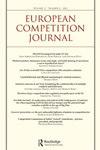芝加哥、哈佛、弗赖堡,还是单一市场整合的考虑因素?用指数随机图模型分析支撑欧盟委员会合并控制的理论和概念见解
Q2 Social Sciences
引用次数: 0
摘要
摘要欧盟委员会对欧盟的合并控制拥有中央权力。因此,它负责做出重要的合并决策,这些决策势必会影响庞大的市场以及欧盟和非欧盟市场参与者,对更广泛的经济、政治和社会部门产生重大影响。这些决策通常由各种竞争分析和经济理论流派的理论和概念见解提供信息,或者由非经济目标指导。本文分析了根据现行欧盟合并条例(EUMR)批准的合并案件,试图揭示以下见解是否支持委员会的合并控制:芝加哥学院、哈佛学院、弗赖堡学院,以及单一市场整合的考虑因素。采用指数随机图模型(ERGM)方法进行分析。本文章由计算机程序翻译,如有差异,请以英文原文为准。
Chicago, Harvard, Freiburg, or considerations for Single Market integration? Analysis of theoretical and ideational insights underpinning the European Commission’s merger control with exponential random graph models
ABSTRACT The European Commission has central authority over the European Union’s merger control. It is therefore responsible for making important merger decisions that are bound to affect vast markets and EU and non-EU market players, with significant implications for wider economic, political, and societal segments. These decisions are often informed by theoretical and ideational insights from various schools of competition analysis and economic theories, or they are guided by non-economic objectives. This article analyzes merger cases cleared under the current European Union Merger Regulation (EUMR) in an attempt to reveal whether the following insights underpin the Commission’s merger control: the Chicago School, Harvard School, Freiburg School, and considerations for Single Market integration. The analysis is conducted by employing an exponential random graph model (ERGM) approach.
求助全文
通过发布文献求助,成功后即可免费获取论文全文。
去求助
来源期刊

European Competition Journal
Social Sciences-Law
CiteScore
1.50
自引率
0.00%
发文量
12
期刊介绍:
The European Competition Journal publishes outstanding scholarly articles relating to European competition law and economics. Its mission is to help foster learning and debate about how European competition law and policy can continue to develop in an economically rational way. Articles published in the Journal are subject to rigorous peer review by leading experts from around Europe. Topics include: -Vertical and Conglomerate Mergers -Enlargement of the Union - the ramifications for Competition Policy -Unilateral and Coordinated Effects in Merger Control -Modernisation of European Competition law -Cartels and Leniency.
 求助内容:
求助内容: 应助结果提醒方式:
应助结果提醒方式:


